- Getting around Lijiang. Dont stay in the Old Towns more than 2 days, there is nothing to do. KRISS Oct 9, 2013 05:46
- 2013 Beijing Temple Fair BENNYLAU Feb 26, 2013 03:29
- Malaysian traveling from KUL - LAX vis Shanghai PVG ZATI_DY Jan 3, 2013 20:15
The Green Oceans of Anji
- Views: 6652
- |Vote: 1 0
- |Add to Favorites
- |Recommend to Friends
Anji County: Home of Bamboo
Anji (安吉) is actually a county, located in the North East of Zhejiang Province and its largest town is called Dipu (递铺). Anji County is small by Chinese standards with a total population of just 450,000. Apart from a limited number of main roads connecting its few towns, Anji retains a sense of rurality through the innumerable narrow bumpy roads connecting the tiny but frequent villages. Its inhabitants live in the valleys and flatlands between rolling hills and angular mountains, packed in – cheek by jowl – with bamboo.
Riding into Anji County landscape watchers can notice a small but significant change in the vegetation covering the hillsides. The variety of scattered dark pine trees, five-fingered maples and other deciduous trees disappears beneath a sweeping, all encompassing mid-green mass: bamboo.
In fact, bamboo is everywhere. If it is not in the endless forests thrusting skywards then it is lying in horizontal poles, piled precariously on the back of trucks. If it is not on a truck it is in the hands of a local worker lying out its freshly multi-colour-dyed canes in rainbows to dry. If it is not drying it is standing with its pale timber in tee-pee like formation waiting to be collected by one of the glut of furniture factories whose showrooms line the main roads.
It is no accident that last year Anji was responsible for making 1 in every 3 office chairs sold in China – a bizarre claim to fame – but one that goes some way to showing the economic importance of bamboo. The local woodcraft and furniture making industries are not the only beneficiaries of Anji’s bamboo forests. The domestic tourism industry too has recognised the financial rewards possible from bamboo, capitalising on its long and varied cultural and historical significance in China as well as its sheer physical beauty.
Anji County may not be very familiar to foreign travellers in China but there are many opportunities here for learning not only about bamboo culture but also for exploring the many natural features of this area.
Journey to the Big Bamboo Sea (大竹海)
No wonder the Chinese refer to the great forests of bamboo as oceans, I think, as I travel down the turbulent dirt roads. It is late afternoon and I am on my way to Dazhuhai (大竹海, literally Big Bamboo Sea), one of the most well-known tourist destinations in Anji and most famous for being the place where the movie “Crouching Tiger, Hidden Dragon” (卧虎藏龙) filmed its bamboo forest fighting scenes. The hills all around are smothered in the filigree foliage of millions of bamboos that ripple in the breeze. Someone might have thrown a pebble in a pond and created much the same effect , so smoothly do the bamboos move and flow.
The public bus stops in a tiny village called Gangkou (港口). Gangkou means “harbour” and the name is apt for this place on the edge of the vast green sea of bamboo. Here I must transfer to another minibus to complete my journey to Dazhuhai. While I am waiting on the bus, a passenger who has been eyeing me curiously, asks me if I am going to Dazhuhai, I tell her I am. She asks me if I have a place to stay, as it is getting late. I am honest and tell her that in fact, I do not. I had planned to return back to Dipu, I continue.
The lady lives in the tiny, few-house village of Wuyunli (五云里) and runs a farmhouse. The farmhouse is like a bed & breakfast, with optional lunch and evening meal, all provided by the family. She asks me if I want to have a look at a room and perhaps stay, and so I agree.
Twenty minutes later and I get out with the lady at Wuyunli and she leads me into the courtyard of her home. It is filled with succulent plants in pots, and a bright morning glory creeps across the wall. Her little dog woofs at me, sniffs at my feet and decides that I am OK – or so I must assume – as he waddles back, apparently satisfied, to where he was sleeping.
The bamboo forest steps right up to the back of the two-storey house and I love the place immediately. By the time I am guided into a pristine twin room with en-suite bathroom I have already decided to stay here. The lady leaves me with a bowl of freshly washed yangmei (杨梅, tangy red berry-like fruit) and comes back a few moments later with a discount ticket for Dazhuhai. We talk briefly about plans for supper that evening and then I am off at last, minus my backpack, to Dazhuhai.
A Little Bit About Dazhuhai
The quiet road is edged with small, allotment-like pieces of land on one side and bamboo on the other. It is a pleasant 10-minute walk to the entrance of Dazhuhai and it is past 5pm when I arrive. The huge car-park has emptied apart from a few cars and I am content to find myself here at the closing of the day, the crowds having long since returned “ashore” to their comfortable coaches.
Established in 1999, Dazhuhai is the biggest bamboo forest park in the South East of China and covers an area of just under 19km2. It remains “under development” in terms of plans to increase its forest walkways which are currently quite limited.
Dazhuhai still sells itself heavily on its part in Chinese director Ang Lee’s epic movie “Crouching Tiger, Hidden Dragon” and rightly so. The first Chinese movie ever to win Oscars, this sweeping story is filmed against a landscape that is equally compelling: the splendid scenery as unforgettable as the film. The spectacular “flying” fight scenes in the impossibly tall bamboos were filmed here and as I walk beneath this sussurating forest I reflect that the hypnotic beauty of bamboo deserves its place on the big screen alongside that of Zhang Ziyi or Chow Yun Fat.
The Story of Five Woman Spring
The spring itself flows into a stream that runs down the right-hand side of the main path. It is edged by a covered walkway of paths and pergolas and opens out near the entrance of Dazhuhai into a small, shallow pond with stepping-stones.
Five Woman Spring (Wunv quan, 五女泉), like many watercourses in China, has a story to tell. A long time ago, there were five peasant women. Every day the women would come down to the water to wash their clothes and talk together. The women felt that their fellow human beings were poor in heart and mind and so the five women planted some bamboo. Bamboo represents peace, harmony and spirituality in the Buddhist religion and so the women hoped to give their fellow people a place of beauty and contemplation to help heal their spirits. The Buddhist Goddess of Mercy, Guanyin (观音) saw what the five women did and was so moved by their efforts and goodwill that she transformed them into immortals and gave each of them a special name.
One of the women she named “White Tea” (Baicha, 白茶). White Tea is a special kind of green tea that only grows in certain areas around Zhejiang and Fujian Provinces (福建省), so called because of the fine white hairs upon the leaf. It is believed that the perfect cup of White Tea can only be made using water collected from this spring. Water from this spring is also supposed to bring good fortune and blessings to those who drink it.
On Green Oceans
Across the mountains the wind murmurs its sweet words in the ears of billions of narrow leaves, who, bending to catch its messages as one, curl a forest of stilt-like stems in a wave.
There is not another soul on the path as I make my way slowly into the bamboo forest. Movies and springs aside, I am here for the bamboo, and nothing else is important. A group of men, tired from a day of carrying tourists up and down in bamboo chariots, are chatting and laughing at the base of the forest. They gesture towards a chair for me, but I shake my head and continue.
The bamboo is enchanting. The early evening light is turning a warm gold and the forest sits calmly basking in the glow. The tall poles, that can reach up to 20 metres in height, stand in their hundreds as far as my eyes can see. They are a grey-green; pale and old-fashioned, as though a layer of dust has settled upon the stems to soften them. The floor beneath is a pinky-brown carpet of old leaves. Upwards and their fine leaves meet in a canopy of infinite patterns of fresh greens, golds and yellows, each one a single drop in this mighty ocean.
I continue to climb through the almost silent forest. A bird – or perhaps two - makes a high whistling call again and again and again. A barely there breath of wind moves through the forest like a secret, whispered and carried by the bamboos in muted unity. Peace like this is hard to find.
At the top of the hill the path flattens out and leads to a tall, three-storey tower that I climb with eager footsteps. Not to be disappointed I am rewarded with a birds-eye view of this big bamboo sea. The evening-lit golden green fills the distance, the individually fragile leaves suddenly join as one immense whole. The bamboo ocean seems unstoppable – the houses and fields look frail in its wake. I imagine the villages might be overcome by these relentless waves of bamboo, their choppy waters rushing down hill upon hill beyond sight.
Chicken & Yangmei Jiu (杨梅酒)
If not for the failing light, I might stay here longer soaking up the sight and silences of the forest. Still, I need to eat and I am already thinking about the dinner that my host will be preparing for me.
The free-range chickens here that wander through the bamboo forests are expensive but delicious fare. When I arrive back at the farmhouse, a small table awaits me outside, complete with mosquito coils to keep away these unwanted guests. The lady has cooked a stew for me with half a chicken, including its feet and head. The broth is aromatic and a little spicy; she has used aniseed, brown vinegar and garlic. A cold dish of sweet and sour cucumber flavoured with white vinegar, white sugar and a little dried red chilli accompanies the stew. It is simple and fabulous, with that rich and comfortable flavour of home-cooked food the world over.
The husband comes later to offer me a glass of Yangmei jiu, he brews it himself. It is essentially baijiu (白酒), China’s infamously strong spirit, with some yangmei berries added for a little extra taste. I agree to half a glass, though the acidic sweet smell makes my stomach feel queasy. Not a baijiu connoisseur, I sip at the transparent spirit and shudder a little. Strong, yes?, laughs the husband, and I nod in agreement, silently thinking that despite the yangmei, it tastes just like every other glass of baijiu I have ever drunk.
Finishing baijiu quickly is often the best plan and the husband and I do just that. His wife sits on a chair nearby mending some clothes and their little dog sits at a respectful distance watching us dine. The night closes in and the outside light casts a small pool of brightness. Replete with food and alcohol, we talk for a while and then fall silent, sipping green tea, listening to the cicadas whir like high-pitched drills and watching the stars wink into being.
Information (June 2007)
Getting to Anji County (安吉)
Anji County is in the North East of Zhejiang Province, roughly 60km from Hangzhou (杭州). Dipu is the largest town in the county. All buses will go to the small bus station on the outskirts of Dipu, it is the only bus station and you can easily use this as a base from which to explore the whole of Anji. All the buses you need originate from this station. Buy a map from the bus station and ALL the tourist spots are marked. Maps are in Chinese only.
From: Lin’an (临安) to Dipu (递铺)
By: bus
Time: 1 hour 50 minutes
Price: 21RMB
English: Big Bamboo Sea
Chinese: 大竹海 (Full name: 中国大竹海旅游区)
Pinyin: da4 zhu2 hai3
NOTE: Be careful not to mix this place up with 大竹海度假村 which is a holiday resort.
Getting there:
From: Dipu (递铺) to Gangkou (港口)
By: Bus no. 205
Cost: 3.5RMB
Time: 20 minutes
From: Gangkou to Dazhuhai
By: Minibus no. 203
Time: 20 minutes
Entrance Fee: 45RMB
Discount card from my landlady worth 9RMB off the ticket price.
Accommodation
I loved this farmhouse for its location and the amazingly clean rooms. Without doubt one of the nicest rooms I have stayed in throughout my travels in China. The owners do not speak English.
Twin Room: 60RMB per room/per night
24-hour hot water, en-suite bathroom, TV, air-conditioning.
Dinner and breakfast provided at additional cost depending on what you eat. There are also a small restaurant and a tiny shop in the village.
Name of the farmhouse: 大竹海林花农家乐
Telephone: 0572-5209269
Mobile: 13757287120
Address: 安吉大竹海景区五鹤村五云里65号



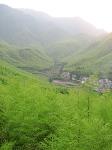
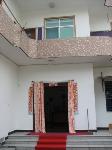
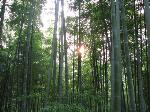
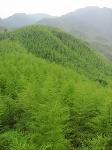
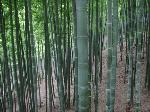
 Copyright © 1998-2026 All rights reserved.
Copyright © 1998-2026 All rights reserved.
1.
Jul 30, 2007 07:23 Reply
JOANNEL said:
You've done it again- your writings are poetry- i floated through green leaves and enjoyed the journey
Joanne in Australia
2.
Jul 8, 2007 20:25 Reply
CAMUS said:
Good Job, I like it